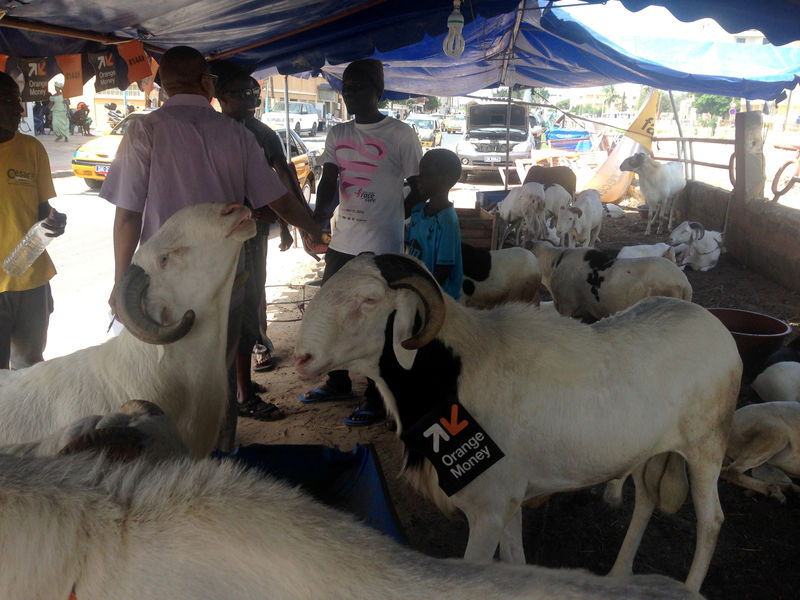By Nellie Peyton and Diadie Ba
DAKAR (Reuters) - Sheep are a hot commodity in Senegal leading up to the Muslim holiday Eid al-Adha, when each family traditionally slaughters a ram for a feast that has become a boomtime for traders who often travel hundreds of miles to sell their livestock.
It is a tradition stretching back centuries, but these days paying for the sacrifice is a whole lot easier and safer than it used to be.
Using mobile money services operated by telecoms firms, traders can accept cashless payments, bypassing the need for a bank.
Drooping from the heat, the animals lolled on sidewalks and packed into vacant lots in the capital Dakar, where their numbers multiplied in the weeks before the holiday on Monday.
Called Tabaski in Senegal, Eid al-Adha commemorates the story of prophet Ibrahim - known to Christians and Jews as Abraham - who was willing to sacrifice his son but was given a ram to kill instead after proving his faith.
On Monday morning, hundreds of men gathered outside a Dakar mosque and boys stood on tiptoe to get a glimpse of the first slaughter before running home to help with their own.
By midday, the streets were stained with blood in the culmination of the West African nation's biggest annual spending splurge.
The government estimated that 700,000 sheep would be needed this year in Senegal, which is more than 90 percent Muslim. There are not enough available domestically, so traders come from neighbors Mali and Mauritania to supply more.
Buyers navigating crowded sheep pens with wads of cash often find their earnings nimbly pick-pocketed. So to avoid this, some sellers have partnered with French telecoms giant Orange (PA:ORAN), allowing customers to complete the transaction on their mobile phones.
First launched in Kenya in 2007, mobile money services have since been rolled out across Africa by companies including Orange, South Africa's MTN (J:MTNJ) and Vodafone (L:VOD) (O:VOD), catering to millions of people who lack affordable bank accounts.
Orange's version, known as Orange Money, was launched in Ivory Coast in 2008 and now has over 18 million users in Africa.
"It allows for greater security," said sheep seller Moustapha Deme, who made about a dozen mobile sheep sales the week before the holiday and said interest in the service was high.
In a dusty pen on the side of the road, he prodded a white ram costing 1 million CFA francs ($1,715) - a Rolls-Royce (LON:RR) among sheep made expensive in part because it had been raised with good quality food and vaccinations, he said.
A less discerning buyer might hope to bring home a scrawny animal for around $200, still exorbitant for many Senegalese.
As with all commodities that shoot up in price because of a predictable surge in demand, the sheep attract speculators. That is despite Senegalese government efforts to clamp down on them.
Bassirou Gueye, a 22-year-old university student trying his luck in the business, and a friend bought ten sheep several days before the holiday, hoping to resell them at the last minute and make some extra cash. Even with mobile money, there are risks.
"If you buy your sheep early it can get stolen," Gueye lamented, sitting in the shade of a market stall surveying his flock. "We stay up all night to guard them."

($1 = 582.9600 CFA francs)